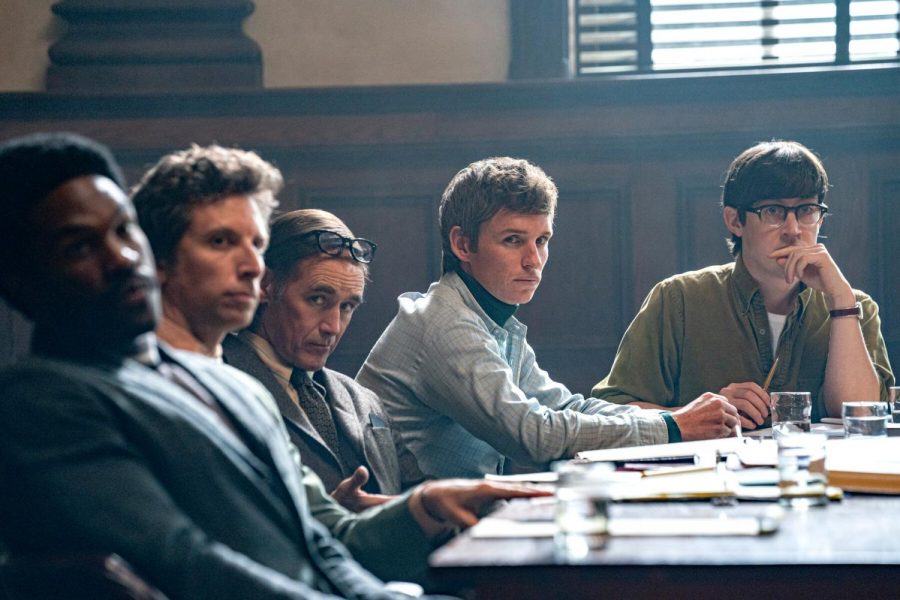‘The Trial of the Chicago 7’ Is Aaron Sorkin’s Idealistic Take on the 1968 Case
October 20, 2020
Aaron Sorkin’s “The Trial of the Chicago 7” is a fast-paced, star-studded, Hollywood-spun reminder that the past isn’t as far behind us as we may like to think.
Clocking in at a two hour and 10 minute run time, the film covers the chaotic six-month trial through a series of flashbacks, jump cuts and real footage spliced with filmed scenes. Sorkin gracefully hops through the history of the iconic trial, and what caused the bubble to burst in the first place.
Abbie Hoffman (Sacha Baron Cohen), Jerry Rubin (Jeremy Strong), David Dellinger (John Carroll Lynch), Tom Hayden (Eddie Redmayne), Rennie Davis (Alex Sharp), John Froines (Danny Flaherty) and Lee Weiner (Noah Robbins) make up the titular “Chicago 7.” The film follows these men, each a participant in the 1968 protests outside the Democratic National Convention, as they face charges of conspiracy to incite the riots that followed.
All 7 were members of the “left,” though to varying degrees: Hoffman and Rubin were co-founders of the Yippies; Dellinger was a pacifist and anti-war activist; Hayden and Davis were affiliates of Students for a Democratic Society and Froines and Weiner were accused of teaching protestors how to make homemade bombs.
The co-founder of the Black Panther Party, Bobby Seale (Yahya Abdul-Mateen II) faces the same charges as the rest of the lot with two major differences – he’s lawyer-less, as his representation undergoes gallbladder surgery, and he’s Black. His presence rounds the defendants out to the “Conspiracy 8.” Seale’s short storyline is marked by his repeated requests for counsel and ends with his being bound and gagged in the courtroom. Ultimately, his case is separated from the rest of the defendants, and the film more or less forgets about the Panthers.
The “Trial of the Chicago 7” is a classic Sorkin project, following in the fast-talking (and walking) footsteps of “The West Wing” and “A Few Good Men.” As such, idealism is expected, along with themes of patriotism and love of one’s country as a motivation for change. I think these points, however, are the film’s downfall: Sorkin chooses to tell the story through the celebrification of activists instead of issues.
The laundry list of historical inaccuracies – including writing the prosecutor, Richard Schultz (Joseph Gordon-Levitt) as sympathetic to the 7’s cause and manufacturing sensual undercover cops to infiltrate the protest plans – distract from the true story, which was compelling enough on its own.
The Hollywood treatment that Sorkin gives the activists turns the story of a group of white men prosecuted for protesting the Vietnam War into a hero’s journey. As such, the focus shifts from what they’re fighting for putting the activists on pedestals. And, while the issues of injustice and war are increasingly relevant today, so is the problem of idealizing activists to the point of celebrity status.
The fairytale of success against the system is solidified in the closing scene, where Hayden reads the names of those killed in the Vietnam War as their closing statement to uproarious applause from the gallery – and even a supportive nod from the prosecution.
While I expect the filmmakers hoped to inspire viewers to pick up a sign and join the throngs of protestors outside fighting the same injustices that the 7 did decades ago, I felt more motivated to hang a poster in my room instead. Although this film was obviously not a documentary, it would have benefited from a refocused narrative on the fight for justice that started centuries before the trial and continues in our communities today.
“The Trial of the Chicago 7” is streaming on Netflix.








